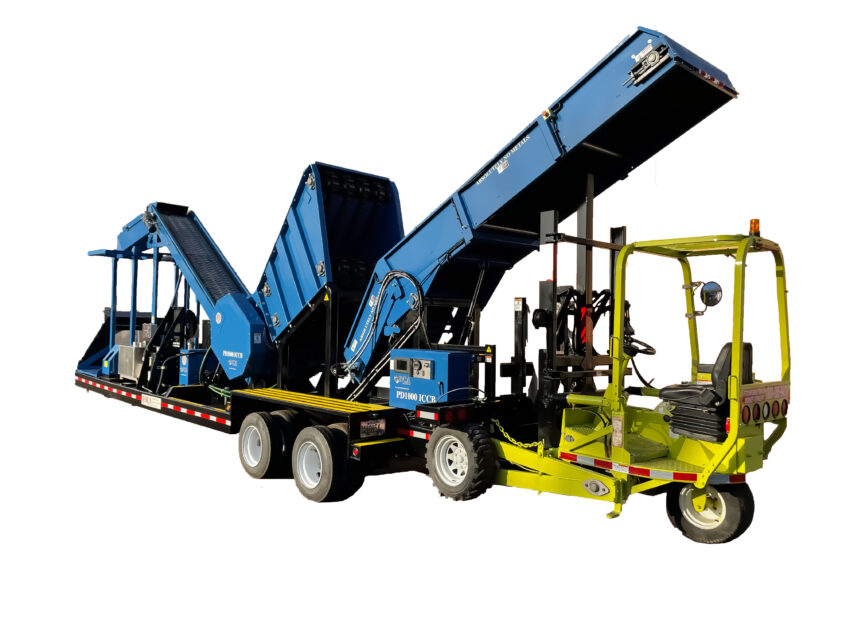Customizable, portable trailer-mounted shredding systems reduce tons of voluminous product in the field down to processable chips
With shipping costs rising dramatically, plastics processors can no longer afford to waste money “shipping air” to recycling plants for oversized products like large garbage bins, barrels, totes, pallets, gas tanks, and vehicle bumpers. As a result, processors are turning to mobile, trailer-mounted shredding systems capable of quickly reducing bulky plastic material onsite into small chips. By increasing the density, shipping costs are dramatically reduced. Shredding the plastic to size and readying it for further processing also maximizes the price that recycling plants pay the initial processor.
Plastic product manufacturers can benefit as well. When the manufacturer operates several facilities, travelling to these to shred scrap for sale can be more cost-effective than paying for expensive waste hauling and disposal. In addition, reconstituting the scrap into source material for its processes can be more lucrative and environmentally beneficial.
Now such recycling is simplified with portable, customizable shredding systems mounted on a fifth-wheel trailer that enable travel to as many sites as needed. After removing steel components from bulky plastic items, processors can crush, compress, shred, chip, size, convey, weigh, and bag the material in supersacks in a single, turnkey process.
“When you chip voluminous product to size in the field, you can cut shipping cost by two-thirds or more by densifying the material and taking the ‘air’ out of the freight cost,” says John Neuens, Sales and Marketing Director of BCA Industries, a Milwaukee, Wisconsin based firm that develops custom solutions for recycling equipment, industrial shredders, CNC machining, welding, and customer product designs. “This type of mobile system not only speeds the rate at which material can be processed, but also allows for controlled size reduction into chips that are worth more per pound when sold to recycling plants.”
Eliminating the High Cost of Shipping Air
In the recycling industry, processors often travel to various locations to collect items such as bulky plastic garbage bins and agricultural totes, which can number in the thousands in waste management yards.
Typically, these bulky containers are stacked in a truck and shipped to recycling plants across the country. However, the rising cost of shipping is making this prohibitively expensive, considering each container is comprised of large voids of unfilled space.
“The smaller the chip, the greater the density and weight of material you can ship in the same space, which translates into greater profit,” says Neuens. “Processors that can convert large plastic items into small chips in the field also get paid more per pound because recycling plants can further process the material more efficiently and achieve much greater throughput using large granulators to get to their customers desired size.”
However, traditional options for reducing extremely bulky plastic objects to chips are cumbersome. While a very large, single-shaft shredder (a simple device consisting of a knife, or multiple knives, attached to a shaft which mates with a stationary bed knife) can satisfactorily cut the objects, the process is slow and creates excessive dust and fines.
Processors may also opt to saw oversized objects to a smaller size utilizing more labor hours before placing them into a large, single shaft granulator that is very inefficient with such bulky feedstock. This approach produces dust and fines, and the plastic can melt without cooling systems, blinding the sizing screen.
With conventional shredders and granulators, reducing plastic to a specific size is difficult because the material is randomly cut until it is small enough to fit through a sizing screen, according to Neuens. “With this approach, 20 to 50 percent of the material ends up incorrectly sized due to variability in screening and processing with fines being another problem to be dealt with,” he says.
In an effort to address the root cause of such inconsistent sizing while providing for mobile use, BCA has developed cost-effective, customizable, portable shredding systems using a patented single pass system rather than screening.
These systems can quickly reduce oversized plastic onsite, fill half-ton supersacks and load the supersacks onto trucks. The complete process significantly reduces shipping costs by enabling more product to be transported in the same space. Just as important, it maximizes the sale price by reducing the need for further processing.
The shredding technology called PD1000 ICCB Triplus System is designed to crush, compress, shred, chip, size, convey, weigh, and supersack ship oversize plastic product in a turnkey process. The system is designed and built as a fifth-wheel trailer, which weighs under 32,000 pounds. This weight includes an optional, lightweight portable forklift used to move material to the shredder and to convey supersacks full of plastic chips to trucks for transport to recycling plants. According to Neuens, the forklift can load one supersack while the other is filled in a very efficient, continual operation using diverter chutes.
By incorporating the patented Triplus knife system technology, a standard shredder is transformed into a hybrid doing the process work of a dual shaft rotary shear shredder and a single shaft granulator, but without the need of screening. The technology uses the precision grabbing action of the high torque, dual shaft shredder to cut the width of the material, while the Triplus bed knife design of the shredder sizes the length. The process produces accurately sized material in one pass without a screen. End-product size is based on the size and geometry of the knives and can be designed for the size the customer requires.
Unlike traditional equipment, the knife system is capable of shredding, chipping, and sizing any type or size of plastic in a single pass without using a screen. A shredder utilizing this design can produce over 85% correctly sized material in one pass with less than 10% oversized material and a tiny percentage of fines.
When cutting to size is important, for complete, customizable, onsite shredding and shipping operations, plastics recycling professionals can achieve approximately 2×2-inch chips at an example rate of 2 tons per hour for 50-to-96-gallon waste bins with the knife system. A secondary Triplus system is available that can further reduce 2-inch plastic chips down to 3/8-inch size, again without screening, if desired. Stationary Triplus systems can be built to far greater throughput as well.
According to Neuens, the system utilizes a rotary bar system that crushes and feeds plastic containers up to 96 gallons into a 48-inch, 1000 series Triplus knife system. The chipped product is then typically conveyed into a bagger system, which includes a diverter and weigh scale integrated with two supersack stations, each of which holds up to 1,000 lbs. capacity.
“The portable system can bag or convey approximately two to two-and-a-half tons per hour of curbside waste bin material,” says Neuens.
Because every organization has unique shredding requirements, the portable system is customized to suit specific needs. It can be ordered in various sizes and capacities, and with or without items such as the baggers, weigh scales, or lift truck.
“It is not an off-the-shelf, fixed system on a trailer,” says Neuens. “It is a complete end-to-end system custom designed to fit the application that just happens to be built on a fifth-wheel trailer.”
While processors have long shipped bulky plastic objects like waste bins, bumpers, 55-gallon plastic drums and plastic pallets to recycling plants despite the inefficiencies involved, the recycling industry now has more cost-effective methods to lower shipping costs as well as boost productivity and profit.
For more information: call 414-353-1002; fax 414-353-1003; email john@bca-industries.com; visit www.bca-industries.com; or write to BCA Industries, 7026 N. Teutonia Ave., Milwaukee, WI 53209.

